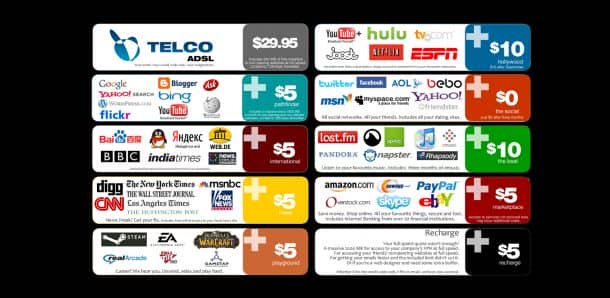Net Neutrality means an internet that allows users to use their freedom of free speech. This means that ISP should be providing us with internet that is discrimination free against any application or content that is being streamed over those networks. Just the way our phone companies cannot decide who to call and what to say to that person, similarly, Internet Service Providers should also not interfere with the content that we want to view or post online. Not only it is against the internet’s basic principles but also against the right of freedom of speech.
When a person is online he/she expect to be connected to any website they want. The user wants to know that their network provider is not messing with their bandwidth or data and is connecting the user to the desired website, application and the content they want to view. The user expects and deserves to be in control of their internet experience, not the provider. This is a simple layman definition of Net Neutrality.
Net neutrality is, in fact, the basic guiding principle of the internet. It gives the right to users to communicate freely online. This was what internet’s core purpose. The principle of Net Neutrality prohibits the internet service providers from speeding up or slowing down the speed or blocking up any content, application or website without the users’ discretion.
An action against Net Neutrality was taken in 2015 too, where millions of activists pressured the Federal Communications Commission to adopt Net Neutrality rules and keep the internet free and open. This year, Trump’s FCC Chairman, Ajit Pai, has again taken the action against the Net Neutrality. In May, FCC voted to move forward with Ajit Pai’s plan of killing net neutrality. Millions of comments flooded against the plan, however, it has not been canceled yet. On 14th December, FCC will give a final vote to Pai’s proposal. You can vote here against the proposal if you want to speak against the proposal.
FCC adopted a strong Net Neutrality rule based on Title II of Communications Act. This act gives the users the strongest protection possible. But since then the opponents have done everything in their reach to destroy Net Neutrality. Chairman Pai, who is also a former lawyer of Verison, is now determined to destroy the open internet.

Two earlier attempts by FCC to change Net Neutrality rules were rejected by the Court and were told that if they want to adopt such protections they should follow proper legal foundation that is, Title II. In 2015, FCC gave internet users the strongest possible internet rules under Title II. Under Title II, FCC has the authority to make sure that the companies like AT&T, Comcast and Verizon cannot block, throttle or interfere with web traffic. However, Chairman Pai wants to ditch Title II and return FCC to Title I approach. Which means that the control of the internet will be in the hands of those companies that have been violating Net Neutrality for years before FCC adopted its current rules. Under Title I, no protection can be given to an ordinary internet user.
Net Neutrality is essential for every single person who uses the internet. People of different ethnicity and origin share their stories online. Small business owners, entrepreneurs, and startups use the internet to run their businesses. Students use it to learn from various websites and videos. No company should be allowed to mess with this open market. ISPs are like the internet gatekeepers and without Net Neutrality, they will do their best to seize every possible opportunity to let commoners get profit. If Net Neutrality is seized, future Google and Facebook will never get off the ground and we won’t be able to launch our small ventures. Pai is ignoring the public voice against the decision and if Trumps administration wins, we will lose our freedom of the discrimination-free internet. You can join hands and urge the FCC to ditch Pai’s plan and vote against him on 14th December.


